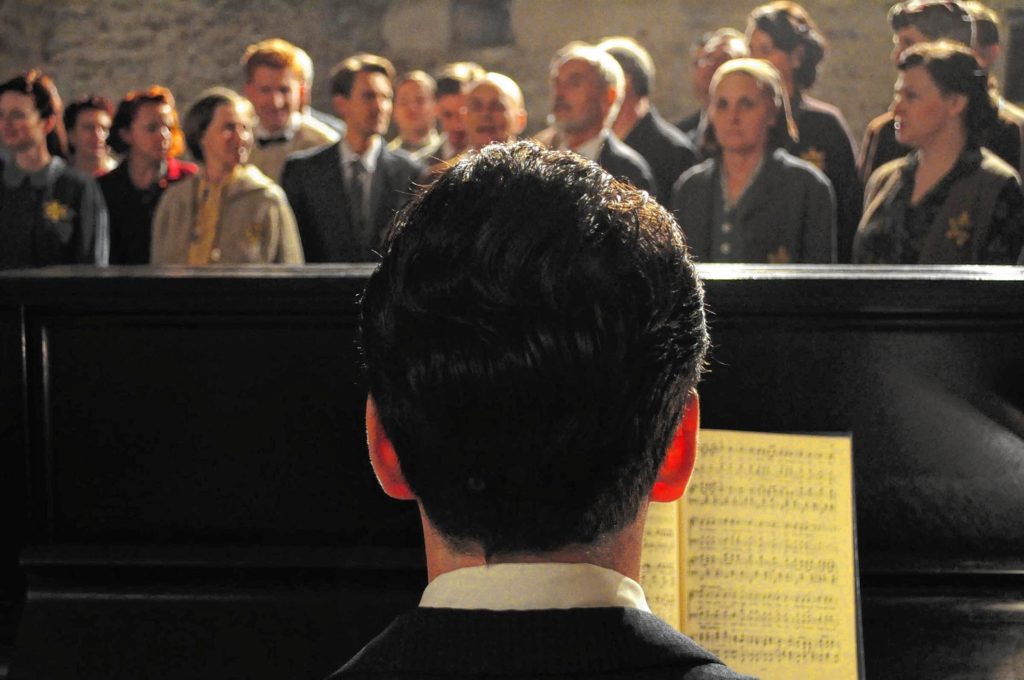Notes on War
When it comes to war and film, there will never be a shortage of stories. Whether tales of daring or death, on the front or at home, war can bring out the best and worst in us, and create lifelong strength — or leave one with lasting wounds. And while we at home, removed from the reality of conflict, might imagine our soldiers as one mass of humanity, the truth is that they are millions of individuals, each with their own histories, and each with their own stories to tell of what they’ve seen.
This week, director Doug Shultz’s documentary film Defiant Requiem comes to the Yiddish Book Center in Amherst to tell one such story. Screening on Sunday at 2 p.m., the documentary chronicles a piece of often overlooked World War II history from the depths of the Nazi’s Terezin concentration camp.
It was there that imprisoned conductor Rafael Schächter discovered an unused piano hidden away in a basement, and began giving nightly concerts for his fellow inmates. It is impossible for most of us today — where the world’s history of recorded music is mostly available just a few taps away — to imagine just how powerful those sounds could be. Schächter’s recitals engendered a short-lived but powerful series of art events within the prison walls, complete with their own hand-drawn promotional posters, some of which survived to stand as a testament to the power of art in the face of horror.
But Schächter’s greatest triumph came in a performance of Verdi’s Requiem, a powerful and difficult choral piece which he reimagined as a condemnation of Hitler’s ideologies. A demanding teacher, Schächter taught his fellow inmates the piece line by line, and several of the survivors from Terezin speak here of the power that Schächter’s high standards gave them, at least on a spiritual level.
There are actually two Requiems in Shultz’s film: the 1944 wartime version, and another from 2010, when American conductor Murry Sidlin returned to Terezin for a tribute performance. It is the preparation for Sidlin’s concert that provides the film with its opening setup, but if Sidlin’s performance is an important signpost that directs listeners back to Schächter, there is also no doubt that Schächter — and by extension all of us who look to art in the face of the abyss — is the true heart of the film.
We are entering a time when we will soon lose the last of those who bore witness to the devastation of World War II, and as we edge forward into that time, films like Defiant Requiem — with archive footage and interviews with those who were there (and also, it should be said, some questionable reenactments) — will only become more important. Because not only will they remind us of what we could have become, they will also remind us of how we overcame, and the importance — the necessity — of art in helping us to do it.
Also this week: When David Bowie passed away this January, it felt in some ways like the last and greatest transformation of an artist whose life was marked by a polite but steadfast refusal to stand still. For Bowie, stagnation was the true death. And so in July of 1973, when he came to the end of a year on the road in his Ziggy Stardust persona, he decided that the final show, at London’s Hammersmith Odeon, would be Ziggy’s last show as well.
He told only a few trusted associates. But his record label, luckily, had invited music documentarian D.A. Pennebaker (who lensed the dynamite Dylan documentary Don’t Look Back) to capture some of the wild atmosphere that was part and parcel of the Ziggy years. The result — which plays at Amherst Cinema on Thursday at 7pm — is Ziggy Stardust and the Spiders From Mars. It is both a look back at the fashions and trends of past decades and a clarion call to future artists of all stripes to follow their muse, and to never rest simply because one can.
Jack Brown can be reached at cinemadope@gmail.com.



